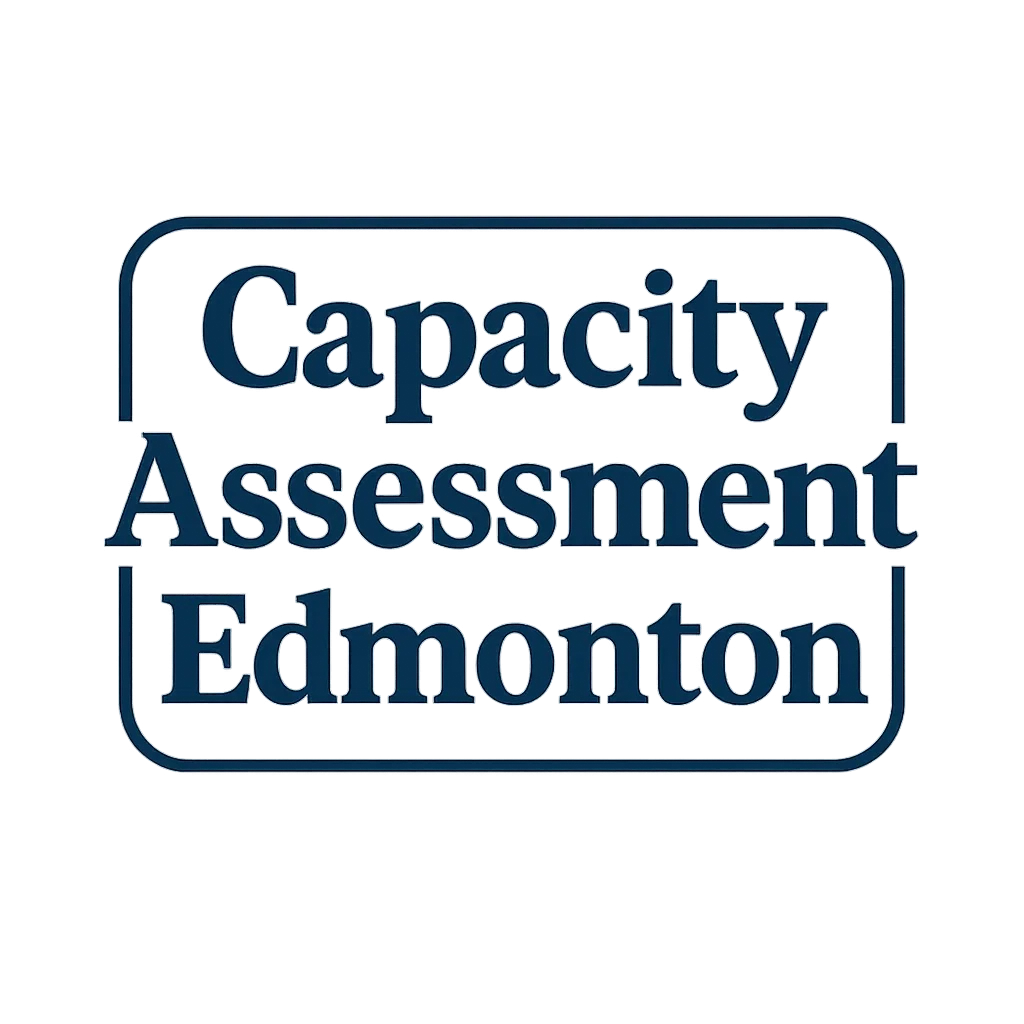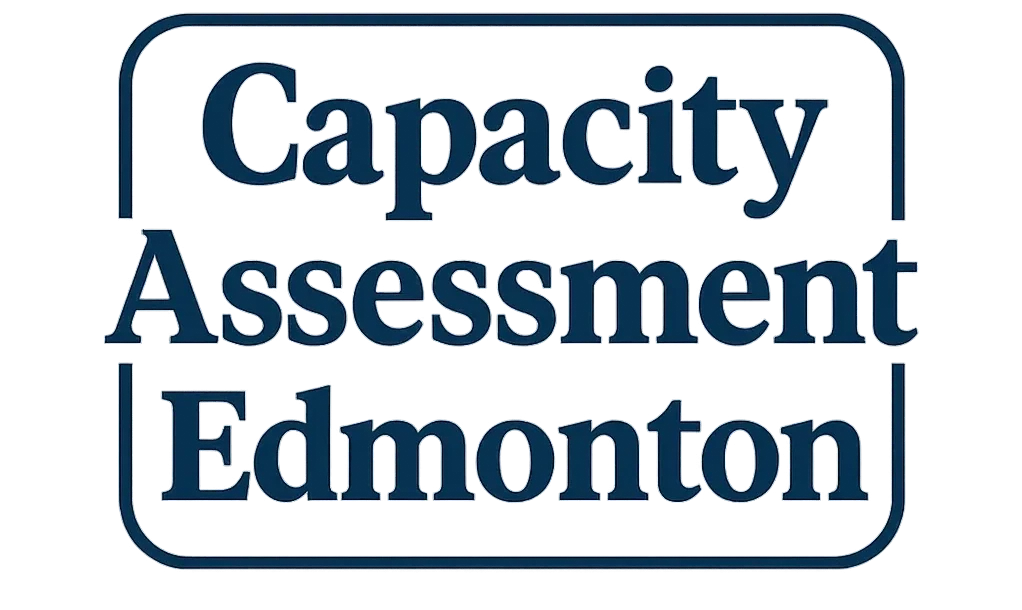Edmonton Capacity Assessment
July 28, 2025

Navigating Edmonton’s Capacity Assessment

The first time I heard the words ‘capacity assessment,’ I might have mistaken it for something you’d do at a gym. But, after accompanying my aunt through the process in Edmonton, I learned it’s much more profound—and just as nerve-wracking, if not more! Here’s a candid look at what I wish I’d known before starting: from the intricate steps to the unexpected emotional curveballs.
1. Shining a Light on ‘Capacity Assessment Edmonton’: Not Just Paperwork
Imagine this scenario: your loved one struggles to remember today’s date, gets confused about their medications, or can’t quite grasp why their bank account keeps shrinking. What comes next? For many Edmonton families, this moment triggers a difficult but necessary conversation about Capacity Assessment Edmonton.
Here’s what I’ve learned through personal experience—capacity assessment isn’t a cold checklist designed to strip away someone’s independence. Instead, it’s a careful evaluation that determines someone’s ability to manage personal, medical, and financial choices. Think of it as a safety net, not a trap.
The legal framework comes from Alberta’s Adult Guardianship and Trusteeship Act (AGTA). Yes, there’s a lot of legalese involved, and I’ll admit—reading through it made my head spin initially. But this legislation is crucial for protecting rights while ensuring vulnerable adults get the support they need. Research shows that AGTA compliance ensures process integrity, which means every assessment follows the same high standards.
Why Edmonton Makes It Personal
What makes Edmonton special? Local Designated Capacity Assessors (DCAs) receive specialized training under AGTA requirements. These aren’t just bureaucrats with clipboards—they’re professionals who complete a mandatory 3-day training course specifically designed for our region. This hyper-local approach means they understand Edmonton’s unique community resources and cultural nuances.
I witnessed this firsthand with my aunt last year. She initially bristled at the word “capacity,” feeling like we were questioning her intelligence. But her Designated Capacity Assessor took time to explain each step, using simple language and showing genuine respect for her concerns. The transformation was remarkable.
“The role of a Designated Capacity Assessor goes beyond ticking boxes—it’s about dignity and clarity.” – Dr. M. Ng
The Comfort of Home-Based Assessments
Here’s something that surprised me: many In-home Evaluations Edmonton actually take place in the person’s own living room. Research indicates that home-based assessments increase comfort levels significantly. When my aunt’s assessor arrived, I nervously offered cookies—and they actually helped break the ice more than I expected!
This isn’t just about convenience. Being in familiar surroundings allows the person being assessed to feel more relaxed and demonstrate their true capabilities. They can show how they navigate their daily routines, manage their medications, and handle their personal space.
The process focuses on real-world decision-making abilities across four key areas: healthcare choices, residential decisions, personal care, and financial management. It’s comprehensive but conducted with sensitivity.
If you’re considering a capacity assessment appointment, remember that this isn’t about taking away someone’s rights—it’s about ensuring they have the right support to maintain their dignity and autonomy as much as possible.
Inside the Capacity Assessment Process—What Actually Happens?
I’ll be honest—when I first learned about the Capacity Assessment Process in Edmonton, I expected something cold and clinical. But what actually happens is quite different from what most people imagine.
The Gentle Beginning: Pre-Assessment
Step one involves what I call the “soft approach.” The idea is floated gently—nobody wants a surprise test! This pre-assessment phase recognizes that emotional readiness counts. It’s not about ambushing someone with formal questions right away. Instead, the process starts softer than most people expect, giving everyone time to understand what’s happening and why.
During this phase, I’ve noticed that families often feel relieved. There’s space to ask questions, express concerns, and mentally prepare for what comes next.
Medical Review: Ruling Out the Obvious
Before any formal evaluation begins, doctors conduct a thorough medical review to rule out reversible causes like delirium or depression. And no, caffeine withdrawal isn’t a disqualifier! This medical pre-assessment weeds out issues that might be mistaken for loss of capacity.
Research shows that Edmonton’s process is designed for both legal accuracy and client comfort, and this medical screening exemplifies that balance. It ensures we’re not confusing temporary medical issues with genuine capacity concerns.
The Heart of It: The Capacity Assessment Interview
Here’s where things get real. A Designated Capacity Assessor (DCA) guides the individual through real-world questions about health, money, and daily life. But here’s a side note that surprised me: you really do get asked about your own routines and priorities. It’s surprisingly personal.
DCAs use both standardized questions and open-ended ones, aiming for what professionals call a patient-centred approach. As Dr. S. Ahmed puts it:
“A patient-centred approach isn’t just a catchphrase—it’s standard practice here in Edmonton.”
The interview doesn’t feel like a test. Instead, it’s more like a structured conversation about how someone makes decisions in their daily life. Questions might cover everything from managing medications to handling finances, but they’re grounded in real situations.
The Final Piece: The Capacity Assessment Report
After the interview comes the Capacity Assessment Report—and this is where good assessors really shine. The report is detailed and decisive, but it’s written with the lived experience in mind, not drowning in legal jargon. At least, that’s the case with the good assessors.
This comprehensive report shapes the next steps, whether that’s guardianship, trusteeship, or determining that no additional support is needed. It becomes the foundation for whatever legal or care decisions follow.
What strikes me most about Edmonton’s approach is how it balances legal requirements with genuine human care. The entire process—from pre-assessment through the final report—maintains focus on the person at the center of it all.
3. Designated Capacity Assessor Training: The Humans Behind the Forms
When I first learned about capacity assessor training in Edmonton, I expected dry regulations and endless paperwork. What I discovered was far more human—and surprisingly interactive. The people conducting these assessments aren’t just bureaucrats with clipboards; they’re highly trained professionals who’ve undergone intensive preparation that goes well beyond memorizing forms.
Every Designated Capacity Assessor (DCA) must complete a mandatory 3-day capacity assessment course before they can conduct evaluations. This isn’t your typical workplace training session. Think crash course meets empathy boot camp, complete with quizzes, mentorship opportunities, and ethical debates that can get surprisingly heated.
Role-Playing Your Way to Certification
Here’s where things get interesting—and admittedly awkward. Many DCAs undergo role-play training where they literally act out capacity interviews. I’ve heard from several assessors that these sessions are both uncomfortable and incredibly enlightening. Imagine pretending to be someone struggling with cognitive decline while your colleague practices asking sensitive questions about your ability to manage finances.
One occupational therapist I spoke with put it perfectly:
“Training is about seeing the person, not just the paperwork.” – Jessica Patel, OT
Who Can Become a Capacity Assessor?
The capacity assessment training program is refreshingly inclusive. Social workers, occupational therapists, nurses, and psychologists can all pursue certification. This multi-disciplinary approach means you might find yourself working with someone who brings a completely different perspective to your assessment.
Research shows that professionalism stems from both structured education and hands-on empathy development—and Edmonton’s training reflects this balance. The workshops emphasize communication skills and emotional intelligence alongside regulatory knowledge. It’s not enough to know the Adult Guardianship and Trusteeship Act inside and out; assessors must also learn to navigate complex family dynamics and sensitive conversations.
Beyond the Initial Certification
The learning doesn’t stop after those initial three days. Capacity assessment workshops are offered annually, providing ongoing education opportunities. Some focus on specific scenarios—like assessing someone with dementia versus someone with a brain injury. Others dive deep into cultural sensitivity or legal updates.
What strikes me most about this training system is how it acknowledges that capacity assessment is as much art as science. You can teach someone the technical criteria for decision-making ability, but helping them develop the intuition to recognize when someone is having a bad day versus experiencing genuine cognitive decline? That takes practice, mentorship, and yes, those awkward role-playing sessions.
If you’re considering scheduling an assessment, knowing that your evaluator has gone through this comprehensive preparation might provide some comfort. They’re not just following a checklist—they’re trained to see you as a whole person navigating a difficult situation.

4. Person First: Why In-home and Patient-centred Assessments Matter
I’ll be honest—when I first heard about in-home evaluations for capacity assessments, I thought it was just a nice convenience. Like getting pizza delivered instead of picking it up. But after watching my aunt go through the process in her own loft, I realized there’s something much deeper happening here.
Edmonton’s Capacity Assessment Services have figured out what many other cities are still learning: where you conduct an assessment matters as much as how you conduct it. Research shows that home-based assessment improves accuracy and supports dignity, and I’ve seen this firsthand.
The Real Story Behind In-home Evaluations
When the assessor came to my aunt’s place, something unexpected happened. Instead of sitting nervously at a clinical table, she started showing off her baking skills. She pulled out her recipe cards, explained her system for organizing ingredients, and even demonstrated how she adapted her techniques after her arthritis got worse. The assessor was taking notes the whole time—not because baking was on some official checklist, but because it revealed genuine decision-making abilities in a real-world context.
“Comfortable settings lead to more valid assessments—there’s no substitute for visiting the individual’s everyday environment.” – Dr. Karen Clarke
This wasn’t just about convenience. In-home evaluations reduce anxiety in ways that sterile office environments simply can’t match. My aunt wasn’t performing for a test—she was being herself. And that’s exactly what the assessor needed to see.
What Patient-centred Really Means
Here’s where Edmonton’s approach gets interesting. A patient-centred approach doesn’t just mean being nice to people. It means fundamentally changing the questions being asked. Instead of “Can you manage your finances?” the assessor might ask “Do you want to keep handling your own banking, or would you prefer help with certain parts?”
The difference is huge. One question tests capability in isolation. The other explores actual preferences and real-life decision-making patterns. It’s the difference between a pop quiz and a conversation about your life.
Adapting to Individual Needs
What struck me most was how the assessor adapted throughout the visit. My aunt speaks English as a second language, and sometimes she’d pause to find the right words. Instead of rushing or making assumptions, the assessor would wait, ask clarifying questions, or suggest we include my aunt’s neighbor who sometimes helps translate cultural concepts.
This flexibility extends to communication styles, cultural backgrounds, and personal preferences. Some people think better while walking around their kitchen. Others need to see their important documents spread out on their dining room table. Capacity Assessment Benefits multiply when the process meets people where they are—literally and figuratively.
Edmonton’s commitment to in-home, patient-centred evaluation isn’t just policy—it’s a recognition that capacity exists in context. And sometimes, that context includes showing off your grandmother’s secret cookie recipe to prove you can still make complex decisions just fine, thank you very much.
5. The Legal Tangle: AGTA Rules, Guardianship, and Trusteeship Demystified
Let me be honest with you—when I first encountered Alberta’s Adult Guardianship and Trusteeship Act (AGTA), my head was spinning. Think of it as the recipe everyone must follow when conducting capacity assessments in Edmonton. There’s no wiggle room here; AGTA compliance is mandatory for all Edmonton capacity assessments, and for good reason.
The Act forms the legal backbone of everything we do in this field. Research shows that AGTA is the legal standard, and accurate reports are essential for protecting vulnerable adults. Every assessment I conduct must align with these requirements, ensuring that vulnerable individuals receive proper protection while respecting their autonomy wherever possible.
When Assessment Reports Meet the Courtroom
Here’s where things get interesting—and sometimes nerve-wracking. Legal Guardianship Trusteeship applications rely heavily on the clarity and thoroughness of the assessment report. I’ve seen cases where a well-documented report made the difference between a smooth legal process and months of complications.
As Legal Advocate Elise Connors puts it:
“A well-prepared capacity report opens doors—and sometimes keeps them closed—where it matters most.”
Every Capacity Assessment Report I write serves dual purposes. It’s both a shield protecting the individual’s rights and a lever that can trigger legal action when necessary. The legal speak can be overwhelming, but that’s exactly why these documents need to be crystal clear.
The Reality of Legal Consequences
Assessment reports are often pivotal for legal decisions—clarity and completeness aren’t just nice-to-haves; they’re crucial. I’ve learned that Legal Guardianship Trusteeship is often the result of the assessment process, depending entirely on what the report findings reveal.
AGTA sets specific legal requirements, and capacity reports are frequently used for court proceedings and guardianship applications. The weight of this responsibility keeps me up some nights, knowing that my assessment could fundamentally change someone’s life.
My Personal Advice for Families
If you’re facing a potential capacity assessment situation, here’s my personal tip: bring a list of questions. There’s no such thing as too many when preparing for possible court involvement. I encourage families to ask about:
- How the AGTA requirements will affect their specific situation
- What legal options might result from the assessment
- Timeline expectations for potential guardianship proceedings
- Appeal processes if they disagree with findings
The legal framework might seem intimidating, but understanding how AGTA works in Edmonton’s context makes the entire process more manageable. When you’re ready to navigate this maze, consider booking an appointment with someone who understands both the legal requirements and the human side of these difficult decisions.
6. Navigating Pricing, Booking, and Resources: A True Edmonton Scavenger Hunt
Let me be honest—figuring out Capacity Assessment Pricing in Edmonton feels like solving a puzzle with missing pieces. I’ve learned this the hard way after calling around to different providers. The pricing varies significantly, sometimes even within the same organization depending on the complexity of your case or the assessor’s schedule.
Here’s what I discovered: there’s no standardized rate card sitting somewhere online. One provider quoted me $800, another mentioned $1,200, and a third simply said “it depends.” Always ask for specific pricing upfront. Don’t assume anything. I made that mistake once and got an unpleasant surprise when the bill arrived.
The Online Booking Revolution
The good news? Capacity Assessment Appointment Booking has become much more streamlined. I recently used https://capacityassessmentedmonton.com/capacity-assessment-appointment/ and was genuinely impressed. The process took maybe ten minutes from start to finish. No lengthy phone calls, no playing phone tag with busy offices.
Research shows that transparency and convenience in booking are improving across Edmonton’s capacity assessment landscape. This shift toward online scheduling has been a game-changer for families dealing with urgent situations. You can book appointments at midnight if needed—something that would have been impossible just a few years ago.
The Hidden Gem: Free Training and Resources
Here’s my wild card discovery that might surprise you: some Capacity Assessment Resources are completely free. I stumbled across this while researching training options for healthcare professionals in my family. Several workshops and educational sessions don’t cost a penny.
In this economy, finding quality training that doesn’t break the bank feels like striking gold. Professional bodies and government organizations occasionally sponsor these sessions. Keep your eyes peeled for announcements from the Alberta College of Social Workers or local health authorities.
“Transparency in pricing and ease of access are a big win for Edmontonians.” – Marcia Stevens, social worker
Marcia’s perspective reflects what many of us have experienced. The system is evolving, slowly but surely, toward better accessibility.
Your Resource Hunting Strategy
Don’t limit yourself to obvious sources when seeking Capacity Assessment Resources. I’ve found valuable information in:
- Official government guides (surprisingly readable)
- Professional body newsletters
- Local community forums and Facebook groups
- Hospital social work departments
The landscape changes frequently. New policies, updated forms, revised pricing structures—it’s constant. What worked six months ago might be outdated today. That’s why tapping into multiple information sources keeps you ahead of the curve.
My advice? Start with online Capacity Assessment Appointment booking for convenience, but always confirm pricing details before committing. The scavenger hunt aspect might feel frustrating initially, but the resources are there if you know where to look.
7. Curveballs and Kindness: Wild Cards from the Field
After years of working with families navigating Capacity Assessment Edmonton processes, I’ve learned that the most memorable moments rarely appear in official guidelines. Real life has a way of throwing unexpected twists into even the most carefully planned evaluations.
Take my aunt’s assessment last year. Her family was convinced she’d struggle with basic cognitive tasks. Then the assessor discovered her flawless Sudoku skills – completing expert-level puzzles faster than most teenagers. Sometimes these evaluations reveal hidden strengths that even close family members miss. Research shows that personal nuance is central to meaningful assessments, and my aunt’s story proves this point beautifully.
“Every person brings their own surprises to the assessment table. Expect the unexpected.” – Rajiv Mehta, psychologist
But what happens when families disagree with assessment results? This concern keeps many people awake at night, worried they’ll be stuck with findings that don’t feel right. The good news? Capacity Assessment Benefits include built-in review processes. Families can request clarification, seek second opinions, or formally appeal decisions through proper channels.
I remember one family who initially rejected their father’s assessment results. They felt the evaluation missed his strong decision-making abilities around finances. After requesting additional documentation and meeting with the assessor, they discovered the assessment actually supported many of their father’s capabilities – the language had just been confusing. Sometimes disagreement stems from miscommunication rather than actual procedural errors.
The Human Side of Professional Processes
Here’s something most people don’t expect: Capacity Assessment Evaluation processes are deeply emotional journeys, not just clinical procedures. I’ve watched grown children break down during assessments, not from the results themselves, but from confronting their parent’s changing abilities.
The best advice I can offer? Build emotional support time into your planning. This process often feels like losing independence or certainty about the future. Kindness – from assessors, family members, and support networks – makes an enormous difference in how people experience these transitions.
Professional assessors understand this reality. They know that flexibility and empathy aren’t optional extras but essential requirements. The process isn’t one-size-fits-all because people aren’t one-size-fits-all.
Some assessments unfold smoothly. Others reveal unexpected challenges or surprising strengths. Many involve tears, laughter, or moments of genuine connection between assessors and families. What remains constant is the need for patience and compassion throughout the journey.
If you’re considering a capacity assessment in Edmonton, remember that you’re not just navigating paperwork and procedures. You’re embarking on a process designed to protect rights while acknowledging the complex realities of human capability and dignity. And sometimes, you might just discover that your loved one’s Sudoku skills are more impressive than anyone imagined.
Ready to take the next step? Book your capacity assessment appointment with professionals who understand that every person’s story deserves careful attention and respect.
TL;DR: Making capacity assessments in Edmonton less intimidating—know the process, get the right help, and always expect a curveball or two (personal or otherwise).




